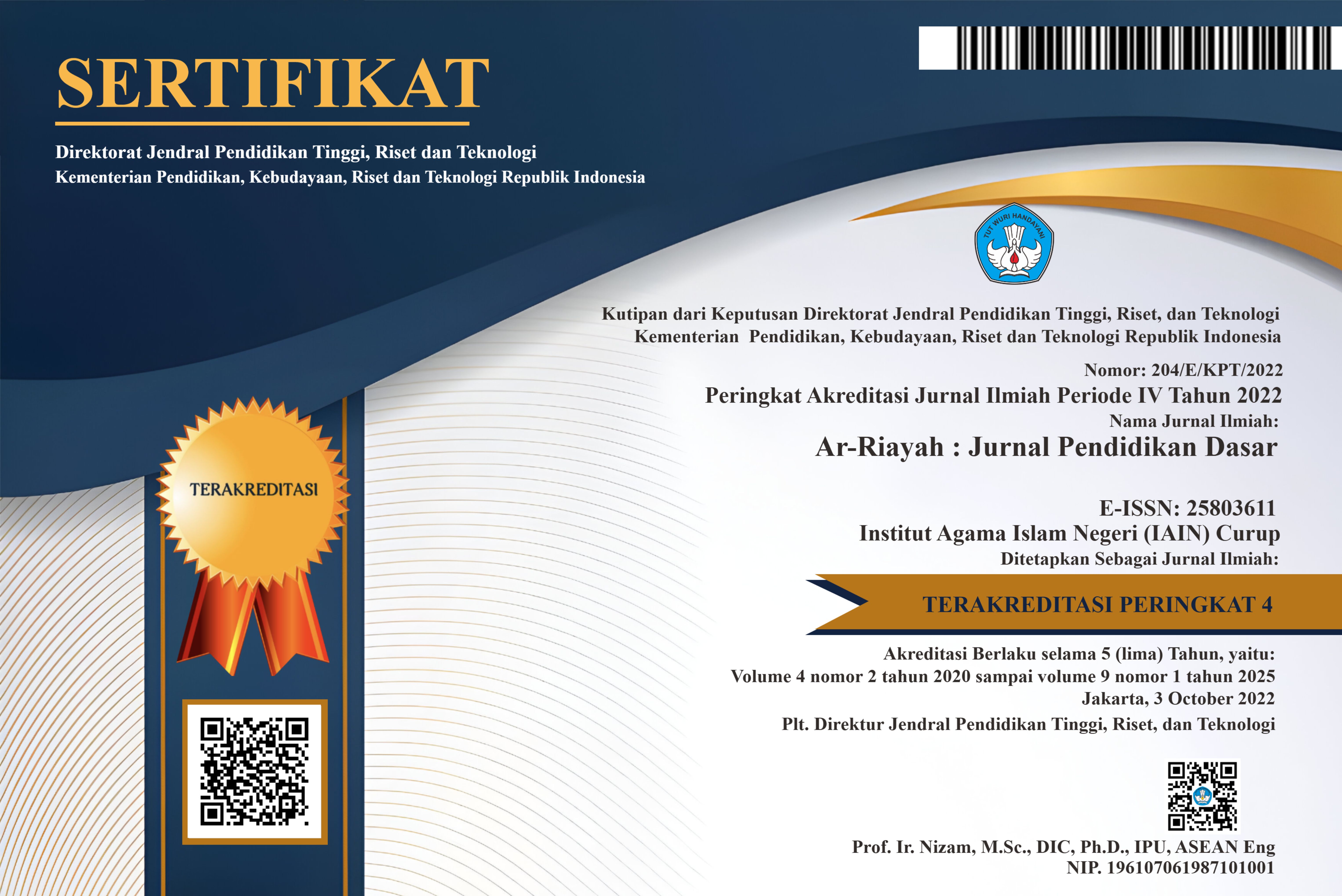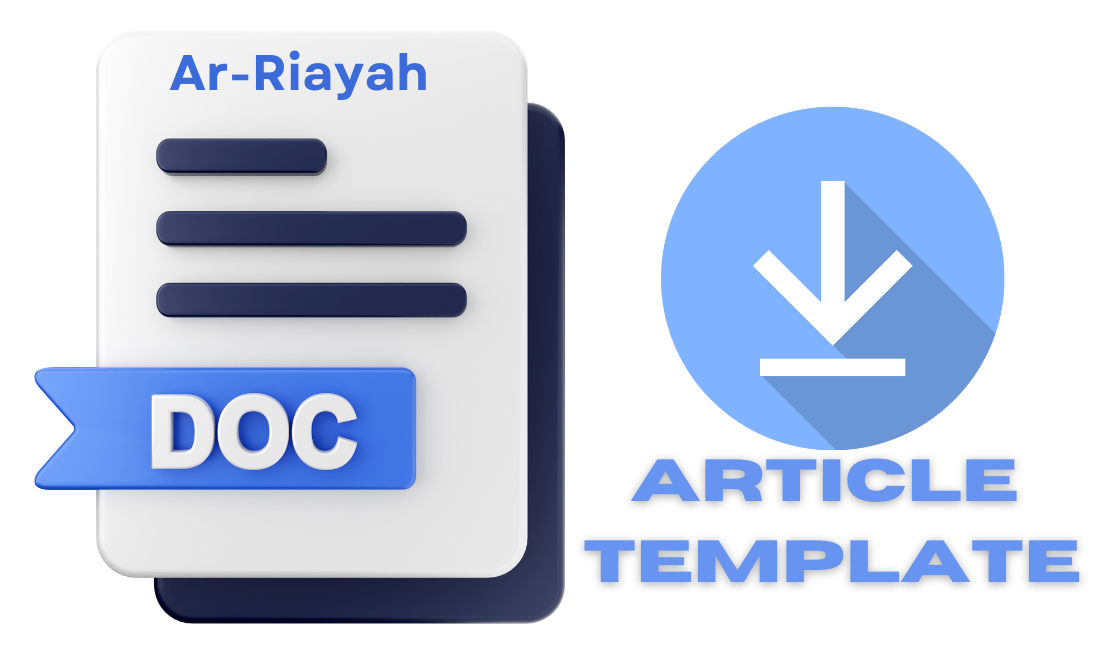Tingkat Kemampuan Berfikir Reflektif Siswa Sekolah Dasar Kelas Tinggi
DOI:
https://doi.org/10.29240/jpd.v4i2.1921Keywords:
Reflective thinking ability, Elementary school, High gradesAbstract
Downloads
References
Ariestyan, Y., Sunardi, & Kurniati, D. (2016). Proses Berpikir Reflektif Siswa Dalam Menyelesaikan Soal Matematika Materi Sistem Persamaan Linear Dua Variabel. Jurnal Kadikma, Vol.7,No.1, hal 94-104.
Babakr, Z. H., Mohamedamin, P., & Kakamad, K. (2019). Piaget’s Cognitive Developmental Theory: Critical Review. In: Education Quarterly Reviews, Vol 2 No.3, 517-524.
Börnert-Ringleb, M. & Wilbert, J. (2018). The Association of Strategy Use and Concrete-Operational Thinking in Primary School. Front. Educ. 3:38. doi: 10.3389/feduc.2018.00038
Choy, S. C. & Oo, P.S. (2012). Reflective Thinking and Teaching Practices: A Precursor for Corporating Critical Thinking Into The Classroom. International Journal of Instruction v5 n1 p167-182.
Daryazadeh, S., et al. (2020). A Modified tool for reflective practice in medical education: Adaptation of the Reflect Rubric in Persian. Journal of Education and Health Promotion. Vol 9 No. 24.
Deringöl, Y. (2019). The relationship between reflective thinking skills and academic achievement in mathematics in fourth-grade primary school students. International Online Journal of Education and Teaching (IOJET) V 6(3). 613-622.
Fatmahanik, U. (2018). Pola Berpikir Reflektif Ditinjau Dari Adversity Quotient. Jurnal Kodifikasia Volume 12 No.2, hal. 275-287
Fuady, A. (2016). Berfikir Reflektif Dalam Pembelajaran Matematika. Jurnal Ilmiah Pendidikan Matematika Volume 1 Nomor 2. Hal. 104-112.
Funny, R.A., et al. (2019). Reflective Thinking Skills of Engineering Students’ in Learning Statistics. Journal on Mathematics Education. Vol. 10 No. 3. pp. 445-458.
Ghanizadeh, A. & Jahedizadeh, S. (2017). Validating the Persian Version of Reflective Thinking Questionnaire and Probing Iranian University Students’ Reflective Thinking and Academic Achievement. International Journal of Instruction. Vol 10 No. 3. pp 209-226.
Gravemeijer, K., Stephan, M., Julie, C. et al. (2017). What Mathematics Education May Prepare Students for the Society of the Future?. Int J of Sci and Math Educ. V 15, 105–123 (2017). https://doi.org/10.1007/s10763-017-9814-6.
Gurol, A. (2011). Determining The reflective thinking skills Of Pre-serviceTeachers in Learning and Teaching Process. Energy Education Science and Technology Part B: Social and Educational Studies, Volume (issue) 3(3): 387-402.
King, L. A. (2011). The Science of Psychology: An Appreciative View. New York: McGraw-Hill.
Lambertus, et al. (2019). Senior High School Students. Different Cognitive Styles and Their Thinking Processes in Solving Mathematical Problems with Scaffolding. International Journal of Innovation, Creativity and Change (IJICC). Volume 10, Issue 6, 2019. Pg 163-174)
Mann, K., Gordon, J., & Macleod, A. (2009). Reflection and Reflective Practice in Health Professions Education: A Systematic Review. Advance in Health Science Education, 14, 595-621. http://dx.doi.org/10.1007/s10459-007-9090-2.
Nindiasari, H. (2013). Ability and Disposition Reflective Thinking Mathematically and Learning Independence High School Students through Learning with Metacognitive Approach. Doctoral Dissertation in the Graduate School of UPI. Bandung: Not published.
Nuriadin, I., et al. (2015). Enhancing Of Students’ Mathematical Reflective Thinking Ability Through Knowledge Sharing Learning Strategy In Senior High School. International Journal of Education and Research Vol. 3 No. 9 September 2015.
Pastorino, E.E., & Doyle-Portillo, S. M. (2013). What is Psychology? Essentials. Belmont, USA: Wadsworth, Cengage Learning.
Prasetyowati, D. & Kartinah. (2018). Berpikir Reflektif Mahasiswa Program Studi Pendidikan Matematika Universitas PGRI Semarang Ditinjau Dari Gaya Kognitif Field Dependent. Jurnal Silogisme: Kajian Ilmu Matematika dan Pembelajarannya Vol 3 No 2 Bulan Desember 2018 Hal 43-47.
Reskiah, Rahman, A. & Dassa, A. (2018). Profil Berpikir Reflektif Siswa Dalam Pemecahan Masalah Aljabar Ditinjau Dari Gaya Kognitif pada Siswa Kelas VIII SMP Negeri 5 Wonomulyo Sulbar. Prosiding Seminar Nasional Vol 03, No 1. Hl. 138-146.
Sabekti, A.W., et al. (2020). Validating the Reflective Thinking Questionnaire and Investigation of the Relationship Between Reflective Thinking and Academic Achievement. Companion Proceedings of the SEADRIC 2019. Pp. 138-144.
Salido, A. & Dasari, D. (2019). The Analysis of Students’ Reflective Thinking Ability Viewed by Students’ Mathematical Ability at Senior High School. IOP Conf. Series: Journal of Physics: Conf. Series 1157 (2019) 022121.
Solso, R. L. M, Otto, H., & Kimberly, M. M. (2011). Cognitive Phsicology 8th Edition. Allyn and Bacon.
Suharna, H. (2012). Berpikir Reflektif (Reflective Thinking) Siswa SD Berkemampuan Matematika Tinggi Dalam Pemahaman Masalah Pecahan. Seminar nasional matematika dan pendidikan matematika. (pp. 377–386).
Suharna, H. (2018). Teori Berpikir Reflektif dalam Menyelesaikan Masalah Matematika. Yogyakarta: Deepublish.
Sunbul, A.M. & Kurnaz, A. (2016). Reflective Thinking and Teaching Reflective Thinkin. International Journal on New Trends in Education and Their Implications-IJONTE. Pg. 167-173
Tican, C. & Taspinar, M. (2015). The Effects of Reflective Thinking-based Teaching Activities on Pre-service Teachers’ Reflective Thinking Skills, Critical Thinking Skills, Democratic Attitudes, and Academic Achievement. The Anthropologist Journal, 20(1,2): 111-120.
Weast, D. (1996). Alternative Teaching Strategies: The Case for Critical Thinking. Teaching Sociology,24, 189-194
Zafer, K.U.S. (2019). Reflective Thinking in Social Studies Curricula (Book Chapter). New Approaches in Social Studies Education (1). pp. 187-202.
Downloads
Published
How to Cite
Issue
Section
Citation Check
License
Authors who publish with Ar-Riayah: Jurnal Pendidikan Dasar agree to the following terms:
Authors retain copyright and grant the journal right of first publication with the work simultaneously licensed under a Creative Commons Attribution-NonCommercial-ShareAlike 4.0 International License (CC BY-NC-SA 4.0) that allows others to share the work with an acknowledgment of the work's authorship and initial publication in this journal.
Authors are able to enter into separate, additional contractual arrangements for the non-exclusive distribution of the journal's published version of the work (e.g., post it to an institutional repository or publish it in a book), with an acknowledgment of its initial publication in this journal.
- Authors are permitted and encouraged to post their work online (e.g., in institutional repositories or on their website) prior to and during the submission process, as it can lead to productive exchanges, as well as earlier and greater citation of published work (See The Effect of Open Access).










